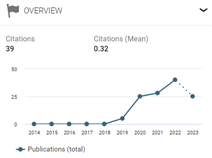Preferensi pangan fungsional dan implikasinya terhadap kesehatan masyarakat: Tinjauan sistematis
DOI: 10.30867/gikes.v5i2.1654Abstract
Background: Currently, there is an increase in public awareness and interest in consuming functional foods as part of a healthy lifestyle. People tend to be more interested in food products that not only meet basic nutritional needs but also provide additional health benefits, such as disease prevention. Understanding the complex factors that influence functional food preferences in society is very necessary to develop efforts to improve public health.
Objective: To determine the determinants of functional food consumption preferences in society and their implications for efforts to improve public health.
Method: This research was prepared using a Systematic Review design with the Preferred Reporting Items for Systematic Reviews (PRISMA) approach. The data used as a reference for this research comes from international scientific publications in the PubMed, ScienceDirect, Emerald Insight and Taylor & Francis databases. The data search process was carried out using relevant keywords such as Functional Food, Consumption, Preferences, Public Health, Factor, and Determinant. This combination of keywords is applied using boolean operators. The articles collected are articles published in the 2019-2023 period.
Results: A systematic review of a synthesis of 11 selected articles shows that functional food consumption preferences in society are influenced by various complex factors, including demographic aspects, food choice motives, living situations, economic factors, health perceptions, sensory, psychological and lifestyle characteristics. These preferences have significant implications for efforts to improve public health.
Conclusion: Determinants of functional food consumption preferences include demographic aspects, food choice motives, living situations, economic factors, health perceptions, sensory, psychological characteristics and lifestyle.
Keywords
Functional food consumption, functional food preferences, public health
Keywords
Full Text:
PDFReferences
Alam, S. S., Ahmad, M. N., Ho, Y.-H., Omar, N. A., & Lin, C.-C. (2020). Applying an extended theory of planned behavior to sustainable food consumption. Sustainability. https://doi.org/10.3390/su12208394
Alvis, C. E., Mosha, M., Amankwah, E. K., Hernandez, R., & Morrison, J. M. (2023). Comparison of caregiver and provider food insecurity screening preferences within a health system. Clinical Pediatrics. https://doi.org/10.1177/00099228231191926
Biresselioglu, M. E. (2023). How to exploit sustainable food consumption habits of individuals: evidence from a household survey in Izmir, Türkiye. Sustainability. https://doi.org/10.3390/su15108271
Boca, G. D. (2021). Factors influencing consumer behavior in sustainable fruit and vegetable consumption in Maramures County, Romania. Sustainability. https://doi.org/10.3390/su13041812
Castellari, E., Ricci, E. C., Stranieri, S., Marette, S., Sarnataro, M., & Soregaroli, C. (2019). Relationships between health and environmental information on the willingness to pay for functional foods: The case of a new aloe vera based product. Nutrients, 11(11). https://doi.org/10.3390/nu11112781
Das, A., Nanda, P. K., Dandapat, P., Bandyopadhyay, S., Gullón, P., Sivaraman, G. K., McClements, D. J., Gullón, B., & Lorenzo, J. M. (2021). Edible mushrooms as functional ingredients for development of healthier and more sustainable muscle foods: A flexitarian approach. Molecules. https://doi.org/10.3390/molecules26092463
Folwarczny, M., Otterbring, T., Sigurdsson, V., Tan, L. K. L., & Li, N. P. (2023). Old minds, new marketplaces: how evolved psychological mechanisms trigger mismatched food preferences. Evolutionary Behavioral Sciences. https://doi.org/10.1037/ebs0000288
Hassan, H., Sade, A. B., & Subramaniam, L. S. (2020). Purchasing functional foods to stay fit. Journal of Humanities and Applied Social Sciences, 2(1), 3–18. https://doi.org/10.1108/jhass-11-2019-0073
Karelakis, C., Zevgitis, P., Galanopoulos, K., & Mattas, K. (2020). Consumer trends and attitudes to functional foods. Journal of International Food and Agribusiness Marketing, 32(3), 266–294. https://doi.org/10.1080/08974438.2019.1599760
Kolosova, E. V, & Молибога, Е. А. (2023). Research and development of frozen biodesert technology with a given composition and properties. https://doi.org/10.21603/-i-ic-58
Kurkcu, B., & Dedeoğlu, B. B. (2022). Restoran tüketicilerinin fonksiyonel gıda tüketiminde hastalığın ve demografik etkenlerin rolü. Journal of Hospitality and Tourism Issues. https://doi.org/10.51525/johti.1103792
Kušar, A. (2023). Consumers’ preferences towards bread characteristics based on food-related lifestyles: insights from Slovenia. Foods. https://doi.org/10.3390/foods12203766
Martins, A. P. de O., Bezerra, M. d. F., Júnior, S. M., Brito, A. F., Urbano, S. A., Borba, L. H. F., Macêdo, C. S., Oliveira, J. P. F. de, & Rangel, A. H. do N. (2021). Factors affecting the consumption of organic and functional foods in Brazil. Food Science and Technology. https://doi.org/10.1590/fst.26820
Martirosyan, D., & Sanchez, S. S. (2022). Quantum and tempus theories of functional food science: establishment of dosage and time of consumption of functional food products. Functional Food Science. https://doi.org/10.31989/ffs.v2i11.1012
Nystrand, B. T., & Olsen, S. O. (2020). Consumers’ attitudes and intentions toward consuming functional foods in Norway. Food Quality and Preference, 80. https://doi.org/10.1016/j.foodqual.2019.103827
Nystrand, B. T., & Olsen, S. O. (2021). Relationships between functional food consumption and individual traits and values: A segmentation approach. Journal of Functional Foods, 86. https://doi.org/10.1016/j.jff.2021.104736
Plasek, B., Lakner, Z., Kasza, G., & Temesi, Á. (2020). Consumer evaluation of the role of functional food products in disease prevention and the characteristics of target groups. Nutrients, 12(1). https://doi.org/10.3390/nu12010069
Plasek, B., Lakner, Z., & Temesi, Á. (2021). I believe it is healthy—Impact of extrinsic product attributes in demonstrating healthiness of functional food products. Nutrients, 13(10). https://doi.org/10.3390/nu13103518
Qasim, H., Liang, Y., Guo, R., Saeed, A., & Ashraf, B. N. (2019). The defining role of environmental self-identity among consumption values and behavioral intention to consume organic food. International Journal of Environmental Research and Public Health. https://doi.org/10.3390/ijerph16071106
Robino, A., Concas, M. P., Catamo, E., & Gasparini, P. (2019). A brief review of genetic approaches to the study of food preferences: current knowledge and future directions. Nutrients. https://doi.org/10.3390/nu11081735
Shrestha, M., Shrestha, S., & Shrestha, N. K. (2022). Chemical composition, health benefits and applications of chia seeds: a review. Tribhuvan University Journal of Food Science and Technology. https://doi.org/10.3126/tujfst.v1i1.49934
Smith, S. N., Mohamed, A. L., Amaral, J. R., Kusi, N., Smith, A., Gordon, S., & López-Sepulcre, A. (2023). Rapid evolution of diet choice in an introduced population of trinidadian guppies. Biology Letters. https://doi.org/10.1098/rsbl.2022.0443
Szakos, D., Ózsvári, L., & Kasza, G. (2022). Health-related nutritional preferences of older adults: A segmentation study for functional food development. Journal of Functional Foods, 92. https://doi.org/10.1016/j.jff.2022.105065
Temesi, Á., Bacsó, Á., Grunert, K. G., & Lakner, Z. (2019). Perceived correspondence of health effects as a new determinant influencing purchase intention for functional food. Nutrients, 11(4). https://doi.org/10.3390/nu11040740
Tian, Y., Zhu, H., Zhang, L., & Chen, H. (2022). Consumer preference for nutritionally fortified eggs and impact of health benefit information. Foods. https://doi.org/10.3390/foods11081145
Tóth, J., Migliore, G., Schifani, G., & Rizzo, G. (2020). Sustainable value creation in the food chain: A consumer perspective. Sustainability (Switzerland), 12(4). https://doi.org/10.3390/su12041438
Vorage, L., Wiseman, N., Graca, J., & Harris, N. (2020). The association of demographic characteristics and food choice motives with the consumption of functional foods in emerging adults. Nutrients, 12(9), 1–14. https://doi.org/10.3390/nu12092582
Wang, E. S. T., & Chu, Y. H. (2020). Influence of consumer’s long-term orientation and safety consciousness on intention to repurchase certified functional foods. Journal of Food Products Marketing, 26(4), 247–261. https://doi.org/10.1080/10454446.2020.1757554
Zhang, A., & Jakku, E. (2020). Australian consumers’ preferences for food attributes: a latent profile analysis. Foods. https://doi.org/10.3390/foods10010056
Zhao, Z., Li, M., Li, C., Wang, T., Xu, Y., Zhan, Z., Dong, W., Shen, Z., Xu, M., Lu, J., Chen, Y., Lai, S., Fan, W., Bi, Y., Wang, W., & Ning, G. (2019). Dietary preferences and diabetic risk in China: a large‐scale nationwide internet data‐based study. Journal of Diabetes. https://doi.org/10.1111/1753-0407.12967
Refbacks
- There are currently no refbacks.













